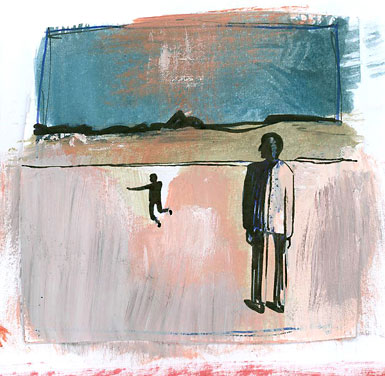 Every Saturday, we’ll be posting a new illustration by David Lester. The Mecca Normal guitarist is visually documenting people, places and events from his band’s 25-year run, with text by vocalist Jean Smith.
Every Saturday, we’ll be posting a new illustration by David Lester. The Mecca Normal guitarist is visually documenting people, places and events from his band’s 25-year run, with text by vocalist Jean Smith.
Michael is really big for 16. He crosses the patio where his 14-year-old sister is frolicking with two friends in an above-ground pool. Michael shuffles through puddles in a black dressing gown and Chinese slippers, his greasy shoulder-length hair swinging. The girls ignore him. “We really hit a wall with him in the spring, but now he’s doing better,” says Wayne. Michael sits down at the patio table, gobbles a peach and wipes his mouth on his filthy T-shirt front. On each of his oddly dainty fingers, he’s wearing women’s wedding rings. “I’m well-known for being humourless,” he informs me in a Rainman monotone. “Nightmares & Dreamscapes. May 4, 2004. 704 pages.” “Michael retains a lot of information about Stephen King novels,” Wayne explains. In a slightly higher voice, Michael says, “Celia, I’m going to tell you something that may surprise you.” “OK,” I say. “I’m not like other 16-year-old boys. I don’t think about sex or perversions.” “That’s good Michael,” Wayne says. “But Celia doesn’t need to know that.” “Desperation. Aug. 1, 1997. 560 pages. I’m going to put my Band-Aid on now,” Michael says, sliding his patio chair back noisily. I watch him trudge back to the house through the puddles. Wayne says, “I’m proud of him. He’s done a lot of hard work. He has Asperger syndrome, which is a type of autism that means he has problems interacting socially and he has very limited interests.” “I don’t mean to be crass,” I say. “But that describes a lot of the men I’ve been meeting through online dating.” Wayne laughs and says, “Well, it does occur in men more than women.” Tiny garden lights come on automatically. Back from the house with a Band-Aid in the middle of his forehead, Michael sits down heavily, rubs his head with both hands and says, “I’ve decided not to go to bed until Celia leaves.” I laugh and ask, “Are you tired?” “Yes, I’m fairly tired.” I glance at Wayne and catch a flicker of irritation. “Why don’t you tell Celia about the book you’re writing, Michael?” “Can I have a sip of your beer, Wayne?” “Sure.” Michael sips and burps loudly. “Thanks, Wayne. That’s good, but it has a powerful aftertaste.” “A powerful aftertaste, eh?” Wayne laughs, and turns to me. “We had some problems with the beer. Michael thought he should be allowed to drink beer whenever he wanted.” Michael sticks out his chin and says, “I didn’t quit for you, Wayne.” “I know you didn’t, Michael. You quit for yourself.” “It’s great to meet another writer,” I say to Michael, changing the subject. “I’m going to go and see the next teenage girl movie that comes out,” Michael says. “I just hope it doesn’t ruin my reputation as a horror writer.” “Do you think Stephen King only goes to horror movies?” Wayne asks. “I like writing,” I say. “Because I’m in control of every little detail.” “I like that too,” says Michael in a clear sweet voice. I say, “You can find inspiration for stories in the most unlikely places.” “I don’t want to be in any unlucky places,” says Michael. “Unlikely,” I repeat, but the girls in the pool are screaming, drowning me out. Wayne looks at me to see how I’m coping with construction of interaction that defines his life. The screaming gets louder. “Unlikely,” I say again. “Not unlucky. Unlikely, meaning unusual.” Michael acts like he understands. “Unlucky places, right.” “Well,” I say. “It’s time for me to get going.” “The Long Walk. April 1, 1999,” says Michael. “384 pages.”






